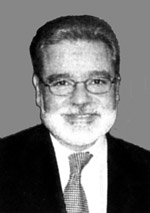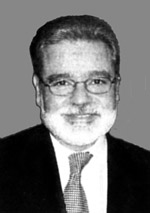
Mr. Jean-Louis Sarbib WB has invested one billion dollars in Yemen, and currently we have projects that are worth of about 670 million dollars. [Archives:2000/47/Interview]
November 20 2000

Mr. Jean-Louis Sarbib, World Bank Vice President for Middle East and North Africa came to Yemen on November 14 on a four-day visit, the first of its kind to this country. The WB is not only working with the government of Yemen, it also has other partners such as NGOs, a number of companies that benefit from the funding of the WB and the communities of Yemen. Mr. Mohammed Hatem al-Qadhi from the Yemen Times met with him and filled the following interview:
Q: Would you tell us about the amount of money allocated by the WB to Yemen since 1995.
A: Since the beginning of the relationship with Yemen which is very long, the WB has invested one billion dollars in Yemen, and currently we have projects that are worth of about 670 million dollars that cover education, water, public works, agriculture services to farmers, power, transpot and as a number of activities in ecomoic reform, privatization program.. These projects disperse over a number of years and we are very satisfied with the speed with which Yemen is using this money.
Q: What are the main issues you discussed with the Yemeni government?
A:We disccused the way which Yemen needs to face the challenges of a very difficult world where the competition is increasing. Yemen faces population explosion challenge, so it needs a lot of economic development, it also faces the challenge of water which could create a very big problem bacause the situation is one of the tightest, if not the tightest in the world. And we discussed also the importance of providing an environment where the private investment can flourish so that jobs can be created. I discussed the importance of the authorities attached to education, particularly education for girls. I also heard the priority the government attaches to vocational training to help the young people who are educated find jobs. I spent quiet a lot of time with the social fund with the public works project because these are the kind of projects that are creating jobs and bringing facilities, schools, roads, health centers to many areas whic have so far not seen much in the way of development activities.
Q: Has the WB any comment on the implementation of economic reform program?
A: If we compare the overall ecomomic situation of Yemen in 1994 when things were very bad, and the situation today, I can say there is a big improvement. That improvement constitutes the foundation of what remains to be done and there is a lot to be done. The progress that has been made on the micro economic front is very clear yet, it is not matched by comparable improvement in the lives of the poorest people, so that is the challenge that is where we are working now with the government. That why I have talked much about poverty, social fund, public works, health, water because this is how the benefit of both microeconomic arrangement is going to be translated into the life of the people.
Q: There are some problems facing foreign investment like the security situation represented by kidnapping..etc. So have you provided the government with any advice in this regard?
A: I think the government is the first to be aware of the consequence of security situation and I dont think the World Bank needs to tell them. I think they are best to deal with it. The very purpose of the ERP (Enamic Reform Program) is to imrove the investement climate. What investors want is an environment which is predictable, they want a legal system that works, they want their projects to be secured. They want to be able to do their financial projectin that is, they want to know whether there will be little inflation, budget is to be managed well, that they will be free to import and export.
Q: Some Yemeni economists think that the project of privatization has targeted establishments which are successful. What is you comment?
A: Well, the goal of privatization is to make the governmnet into a refernce and to not into an actor of commercial activities. It is much better to leave the enterprises to the private sector and to have the government focus on what it should do which is education, health, provide rural roads so the farmers can have access to markets of their projects. We worked in many countries in the world and usually privatization at the end creates new jobs, new reliable services to the people. It is very important to realize where enterprise loses money. It is the people of Yemen who pay instead of getting education, health and water and services, they pay many for people to produce roads that are so bad that the Yemeni consumers dont buy them.
Q: How could you distinguish between the role of the WB and IMF?
A: Well, the IMF (Internationally Monitary Fund) is an international organization which is concerned with macroeconomic policy, with the budget, with monetary policy, with exchange rate and they usually look at things because the budget is assigned yearly, within a shorter time. The WB is much more concerned about long term development issues that have structural measures. We have done plenty of researches with WB that shows that when you make an investment in economy which is not well-managed, it is a waste of money and that is doesnt deliver benefit for the peole. if imgine an engine of a car to be fixed, then the IMF is concerned with the fixing the engine and the World Bank is concerned with giving the gas to get the car moving.
Q: Every three years you have a plan for projects to support and you assign for each plan an amount of money, how much money the WB has assigned to the next three years?
A: The WB agrees with each country in every three years on what is called a country system strategy which essentially defines what the WB country agree to do together for three years. The last one for Yemen we had it approved by the board of the WB in August 1999. So far we believe progress has been made along the line that we have agreed is resonable.
Q: Does the WB have a role in helping Yemen join the WTO?
A: Well we dont play a particular role. If the government were to ask some of our people in Washington to help with certain negautiating points or to provide some assistance, to build the capacity to fulfil the conditions we will be happy to do that. But now we are not involved.
Q: How do you explain the protest of the people around the world to the policy of the WB, if we take into account the demonstrations in the USA?
A: Well, I think part of it is concerned with justice I belive it is something that we welocme in the WB because as they said we are committed and we believe we want the same things . which is less poverty and more equity in the world. I also think many of these protests are very poorly informed about what the WB does. We discussed this with about 250 NGOs: how to work together and these were very constructive discussions. So the goal of the Bank is to recognize that there are very serious issues of inequity in the world and to try and make sure these issues are not ignored. What we disagree in with the protesters is the fact we dont believe that we contribute to creating poverty. We believe we are doing every possible thing to keep these issues very much inside and to try solve them. The policies of the WB are changing all the time because on contrary to what many people think we are not dogmatic institution, we are pragmatic institution. We want to learn from what works and what does not work and the ground we are constantly adjusting our policies based on the results of experience. The problems of development in Yemen, are very difficult problems and no one has a magic al solution. But we are working more and more in an inclusive manner and in a participatory manner. We are trying to talk to people, NGOs and communities look at the activities of the Social Fund and public works, these are the activities the WB is pushing.
The role of journalism in this regard is very important. We have a program in the WB for MENA region to provide an economic training for journalists to organize seminars and try to get people to understand what the WB is and at the same time I belive it is the responsibility of the governments to explain to their peole their policies and not to hide behind the WB.
Q: How do you explain the protest of the people around the world to the policy of the WB, if we take into account the demonstrations in the USA?
A: Well, I think part of it is concerned with justice I belive it is something that we welocme in the WB because as they said we are committed and we believe we want the same things . which is less poverty and more equity in the world. I also think many of these protests are very poorly informed about what the WB does. We discussed this with about 250 NGOs: how to work together and these were very constructive discussions. So the goal of the Bank is to recognize that there are very serious issues of inequity in the world and to try and make sure these issues are not ignored. What we disagree in with the protesters is the fact we dont believe that we contribute to creating poverty. We believe we are doing every possible thing to keep these issues very much inside and to try solve them. The policies of the WB are changing all the time because on contrary to what many people think we are not dogmatic institution, we are pragmatic institution. We want to learn from what works and what does not work and the ground we are constantly adjusting our policies based on the results of experience. The problems of development in Yemen, are very difficult problems and no one has a magic al solution. But we are working more and more in an inclusive manner and in a participatory manner. We are trying to talk to people, NGOs and communities look at the activities of the Social Fund and public works, these are the activities the WB is pushing.
The role of journalism in this regard is very important. We have a program in the WB for MENA region to provide an economic training for journalists to organize seminars and try to get people to understand what the WB is and at the same time I belive it is the responsibility of the governments to explain to their peole their policies and not to hide behind the WB.
——
[archive-e:47-v:2000-y:2000-d:2000-11-20-p:./2000/iss47/intrview.htm]


